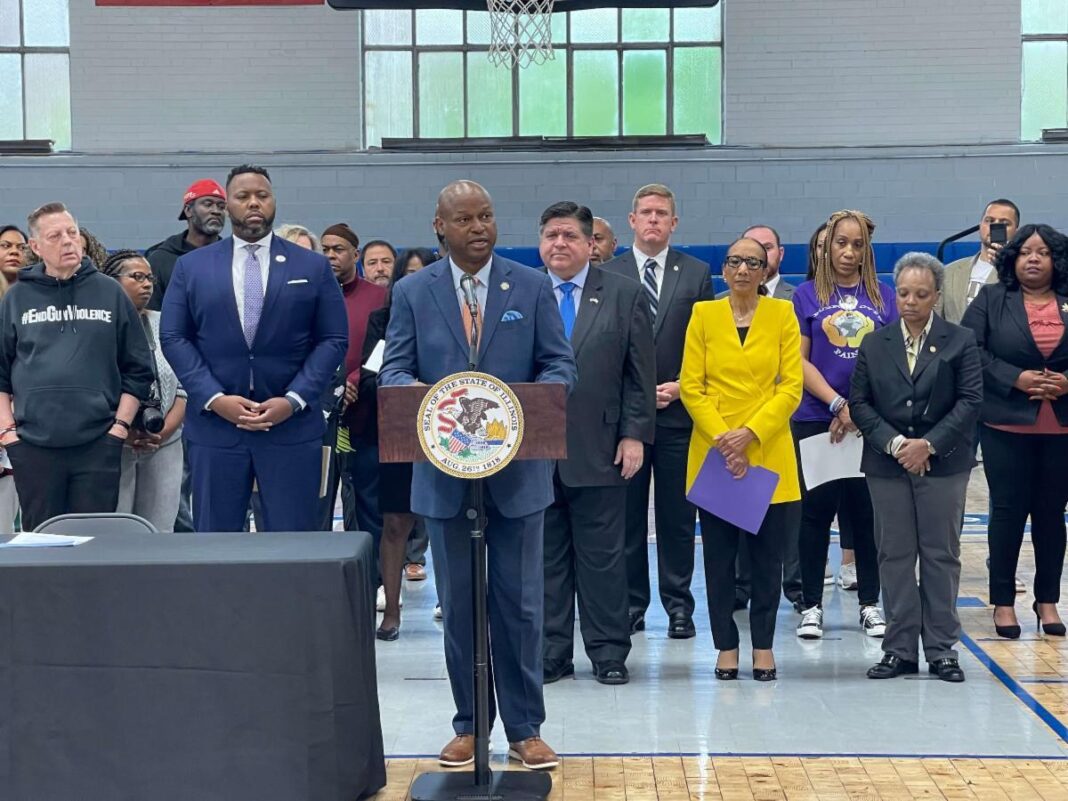CHICAGO: Emanuel “Chris” Welch, the speaker of the Illinois House of Representatives, announced on Friday during a visit to a mosque that he supports the adoption of a law that would grant Arab and Muslim contractors special “minority” status when they bid for a share of more than $46 billion in annual state contracts.
The state’s Minority Business Enterprises and Women’s Business Enterprises policies set aside up to 30 percent of state contracts for businesses that are majority-owned by individuals from designated ethnic minorities — Asian-Indian, Asian-Pacific, Black, Hispanic or Native American — and 5 percent for those majority-owned by women.
Welch said he supports legislation, introduced by Illinois State Representative Cyril Nichols, that would include Arabs as a “recognized minority group” so that they can receive “their fair share” of these state contracts.
“I know that there are some issues that are particularly important to your community and that Representative Nichols has been a leader on those issues,” said Welch, who is the first African American to serve as the Illinois speaker.
“Nichols filed a bill a couple weeks ago that will specifically address the issue of minority status. My office is going to lend him support to make sure we have the necessary hearings on that bill here over the summer.”
Speaking during a meeting at the Orland Park Mosque in suburban Chicago, arranged by American Arab Chamber of Commerce President Hassan Nijem, Welch pledged to push for the bill during the November veto session, when bills are normally reviewed and considered for adoption.
“I think the MBE program is enormously significant because we have been traditionally left out, as minorities, not just in the state of Illinois but in this country,” he said.
“Unfortunately that has been the history of our country and it has taken people like Dr. Martin Luther King and Mohandas Karamchand Gandhi, and all those who came before us, to fight for civil rights and inclusion. That fight continues today. That’s what the MBE program is all about.”
Welch said that the state legislature last month passed a budget worth $46.5 billion and that the “MBE makes sure that money gets into the pockets of people who look like the people of Illinois.”
He added: “Diversity is the strength of the state and everything we do should reflect that diversity, and how we spend that money is very much a part of that.
“Long before I was the speaker, people will tell you, I have fought for diversity on corporate boards, diversity in how we spend our money, diversity in our suppliers.
“And now that I am actually here at the head of the table, trust me, when I am done this community is going to see a big difference.”
Welch urged leaders of the Arab and Muslim communities to “inform and educate” other legislators in the state to help build support for the adoption of the minority classification.
“When Representative Nichols proposes hearings, you need to make sure that the community shows up (and) testifies,” he said. “People that can’t be there, submit written testimony. Let us know why this is such an important issue. How does this help the state? Advocacy really does matter.”
Nichols, who was also at the mosque meeting, said that he realized the real importance of his proposed law in April when he appeared on “The Ray Hanania Radio Show,” which is hosted by the US Arab Radio Network and sponsored by Arab News.
“The speaker is right, you have to call your legislators because I have to get a whole bunch of people to agree with this,” Nichols added. “They need to hear from you. … We always say that if it is righteous, the Most High will make sure that we are covered. We can get a lot done together.”
Welch said: “Power comes from building coalitions and building allies. There is now a Black caucus, a Hispanic caucus and an Asian caucus.”
He added that he anticipates a day when there will be an “Arab Caucus” to help ensure that Arabs and Muslims actively engage at all levels of Illinois government.
“The only way to govern is through inclusive leadership,” Welch said. “I think it is extremely important that your community be a part of this coalition we are building. Nobody is getting left out. Everybody in, nobody left out.
“And that is what this is all about. We are being intentional, we are here for a reason, and we are figuring out ways to make that inclusion happen — and I want to be a part of that … with you.”
Nichols said that Muslims and Arabs in Detroit had raised the issue of minority status, and that he felt the same thing was needed in Illinois, particularly in the Chicago area which is home to more than 450,000 Christian and Muslim Arabs.
Sheikh Kifah Mustapha, the Imam of the Orland Park Mosque, said that the Arab community will communicate and work with legislators to help them understand why the bill is so important to their community.
“With … the potential to be part of future contracts and future business, being declared as a minority is one of the main objectives,” he said. “If it happens, our own community members will have a share of all these contracts, up to 20 or 25 percent … and this means our community will grow and will contribute back to the well-being of the state itself.
“We are happy that the speaker of the house is here, and the representative also, to talk about this issue and what it means and where he can help and support that perspective.”




